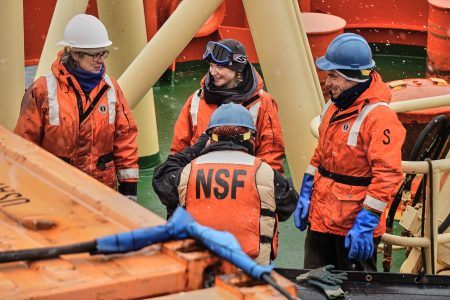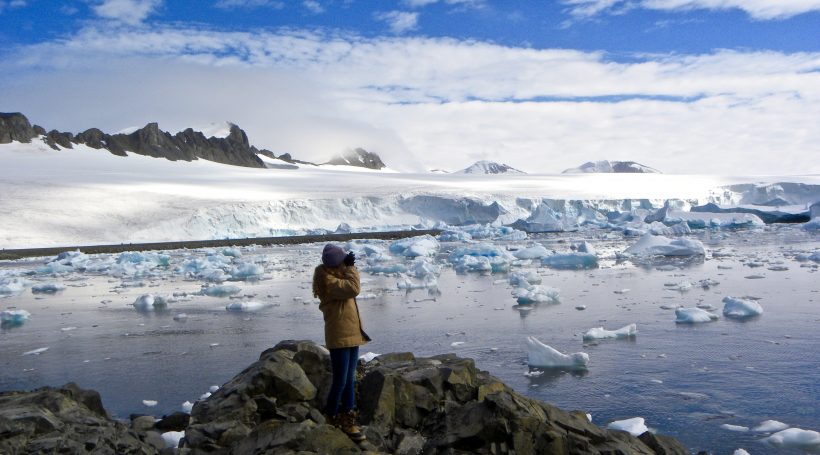 Recently home from one of the world’s most remote and pristine areas – and a once-in-a-lifetime journey – Taylor Dodge and Rachael Young have a lot to get used to: first, they won’t be waking up to glaciers and penguins every morning.
Recently home from one of the world’s most remote and pristine areas – and a once-in-a-lifetime journey – Taylor Dodge and Rachael Young have a lot to get used to: first, they won’t be waking up to glaciers and penguins every morning.
The Rutgers roommates spent the Antarctic summer (winter here on the East Coast) on both land and at sea, studying the impacts of global warming. But the close-knit pair didn’t go together – in fact, they headed to opposite ends of the continent: Dodge traveled to an ecological research station on the West Peninsula,
and Young sailed aboard the Nathaniel B. Palmer – a ship that can carry a helicopter and up to 37 scientists – and worked at a research station at the southernmost tip of Antarctica.
“The work I’m doing is part of a long-term ecological research study,” explains Dodge. “Scientists have been coming down here for years to study the climate and wildlife. The research showcases how much has been changing, and we’re continuing that research. It’s supposed to be one of the most isolated, pristine places on the planet – but it’s changing so rapidly because of all the climate change.”
Dodge notes the weather was cold, but not as cold as people would expect. In some ways, she says, the weather was just like a regular winter in New Jersey (minus the glaciers). The college senior was one of the youngest researchers at her station, spending six weeks at sea studying phytoplankton (a microscopic plant that is a key part of the ocean’s ecosystem) and five weeks on land collecting data on various species. The West Peninsula is one of the fastest warming areas on the entire continent, and Dodge saw with her own eyes the effects of climate change.
“Palmer Station is situated right in front of a glacier on this little rock point. Every year the glacier recedes about 30 feet. You can actually see the ice falling off the glacier. It’s cool to see it when you’re here, but when you think about it, it’s not good, because it’s melting,” she says. “Then you see pictures of Palmer 30 years ago, and the glacier was right at the back door. It’s about a 20-minute walk to where the glacier is now.”
Despite the remoteness of the icy southern continent, living at Palmer Station is like its own little community, with two main buildings that host dormitories, labs, a kitchen where researchers from around the world eat together, a boat house and a store where those staying at the station can grab toiletries, candy or souvenirs. It also has plenty of perks: an outdoor Jacuzzi where Dodge says you can soak and watch glaciers fall into the sea, a gym, a sauna and chefs that keep the busy researchers well-fed – including daily snacks at 10 am and 3 pm.
“The food is amazing. I’ve gained so much weight,” laughs Dodge.
“There’s only 40 of us at our station right now, there’s even less in the wintertime. There’s about 14 in the winter,” adding that cruise ships occasionally come along and go shopping at the store for Palmer Station T-shirts.
“You make a lot of friends with people you’d never expect to make friends with because you wouldn’t interact with them in the real world the same way you do here,” she says. “It’s really unique that way. There’s definitely a prominent woman presence, which is kind of empowering.”
While the once-in-a-lifetime expedition left Dodge with plenty of good memories, it also had its share of learning curves, like when Dodge learned the hard way how unforgiving the elements can be when you’re not prepared.
“It’s always better to pack more layers you can take off. The first day I went out sampling, I didn’t pack enough layers, and I was so cold. I didn’t pack enough gloves. I was freezing. Someone had to give me their coat. It was a terrible experience,” she says. “I had wet, cold gloves on for two hours, it was awful. It was the biggest learning curve.”
Dodge, who grew up in Salem County, knew she wanted to go to Antarctica once she heard about the program as a freshman at Rutgers – New Brunswick. She applied twice, but was rejected both times before finally being accepted to the exclusive program. She even endured a root canal and a litany of other medical tests in order to go.
Her expedition to one of the world’s most remote areas meant an entire day on cramped planes, hopping different connecting flights (which she says was one of the worst parts of her trip) before getting on a ship that took her through the Drake Passage, a waterway between South America and Antarctica that is often known for turbulent, unpredictable waters that many say turn even the most hardened sea-savvy stomachs.
“We had a really, really good Drake crossing. It was smooth. But I’m prone to seasickness. It took me about two weeks to get my sea legs,” Dodge says, although she admits she hopes to join the Navy after college.
On the other side of Antarctica, Young had her own journey and quickly fell into the rhythm of living – and working – on a boat for 12 weeks, studying organisms in the water and using a submersible robot called a glider.
“You get into a routine with these people you see every day. We didn’t really have any social media influences or other outside influences,” Young says, noting
that the ship did get a digital copy of
“The New York Times,” but internet access was limited, making it difficult to talk to family or friends. Both Dodge and Young were only able to speak one time while abroad, and although Dodge did have a phone to contact home, she chose to be a bit isolated, opting to post on Facebook only (but she did make a special call to her grandmother on her birthday).
Young’s time away, of course, had its unique challenges, like the 24-hour sunlight and the general restlessness that comes with being on a boat long-term. But Young, an Ocean City native, still loved those free moments where she got to head out onto the deck to look for orca whales. And, she got to catch the Philadelphia Eagles’ Super Bowl win at sea.
“We had a lot of people from the Massachusetts and Boston areas, so a lot of people were rooting for the Patriots. Of course, the year we couldn’t be there we win and have this crazy parade,” says Young.
“There were definitely days you’d be like, ‘Get me off this ship!’” Young adds. ‘“I just want to go for a run or go outside.’ But for the most part, being out on the ocean – we know how much of a privilege this is.”
Young says the trip helped reaffirm that she’d like to continue a career in marine biology, and that any understanding of the ocean (and how it impacts life on land) is vital.
“I think any sort of research and understanding we can get right now is super important to see where we might go as a whole. Our oceans basically determine what we can do on land. It determines the atmosphere, our coastlines and how that impacts our economies and seafood as well,” she says.
“It’s very important in understanding how to get those basic puzzle pieces to fit into the bigger picture and connect all of that to the broader topics of climate change and how research can further help mitigate that or slow that process down.”
“You’re in this little space with a bunch of people who are passionate about the same thing,” says Young. “It’s super encouraging to know what you’re doing is relevant, and what you’re doing is meaningful.”














